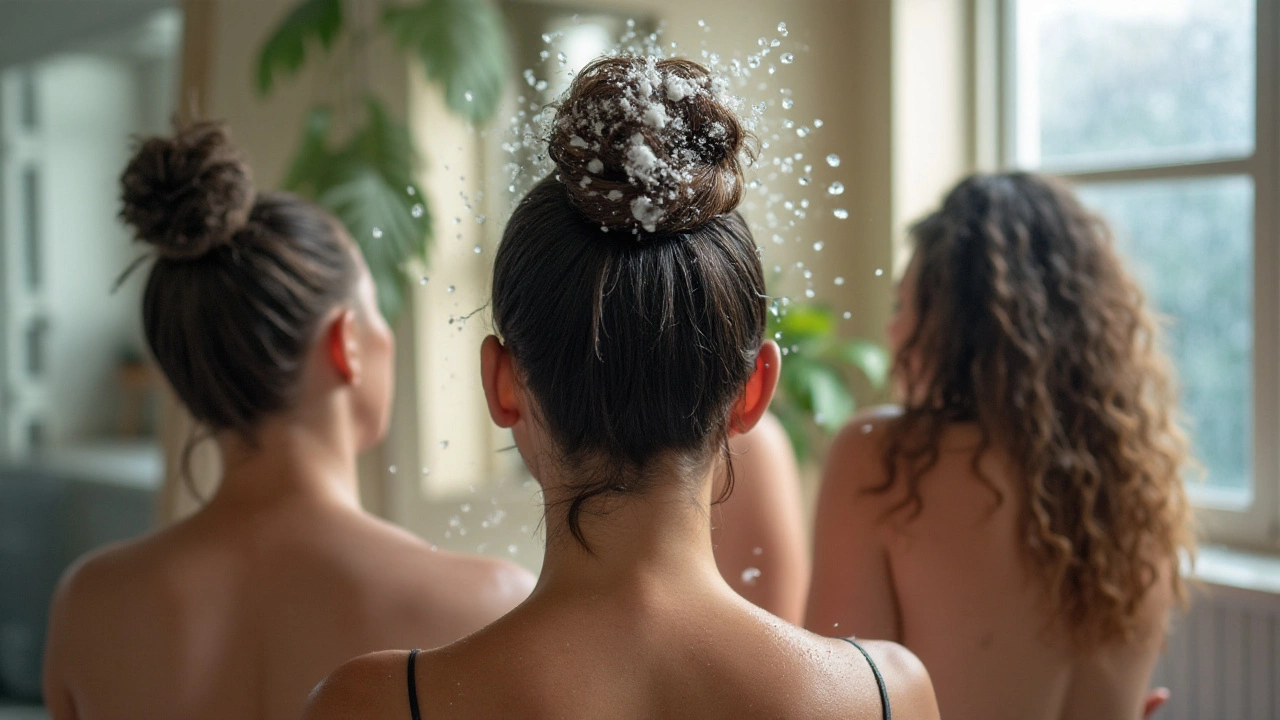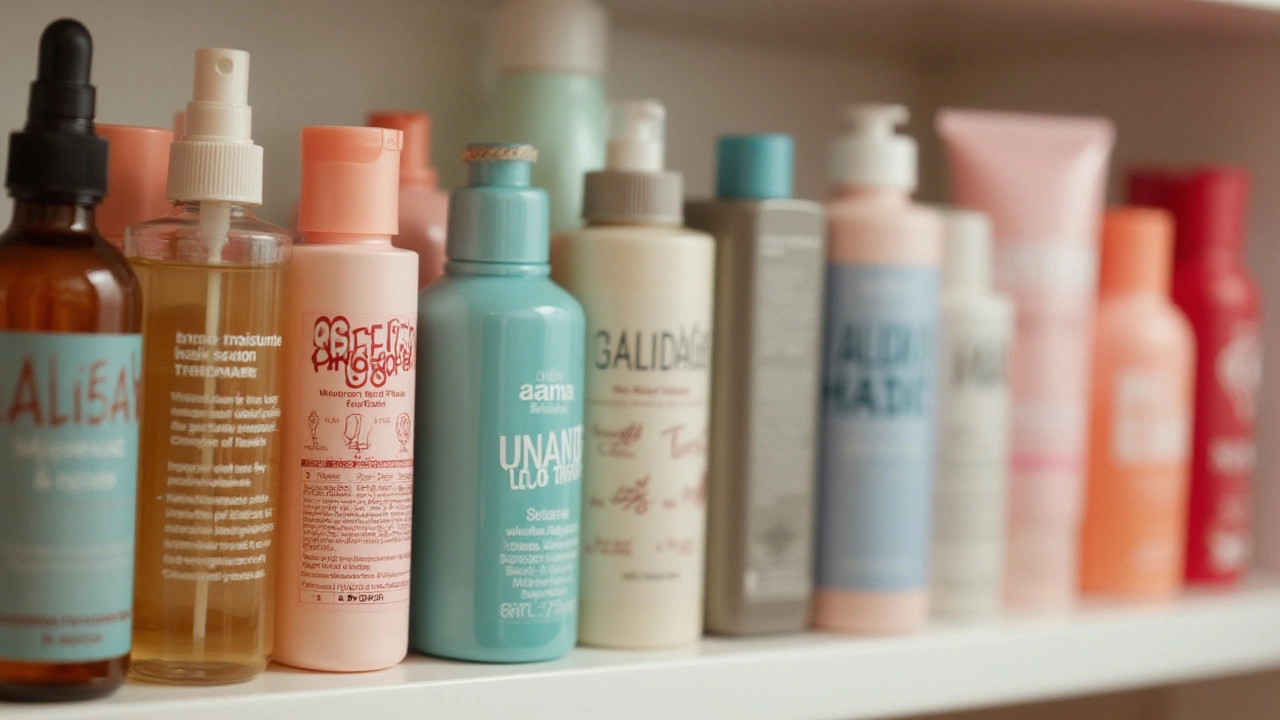How Often to Wash Your Hair: Tips and Tricks for Great Hair Health
 Oct, 16 2024
Oct, 16 2024
How often you should wash your hair is a question that has puzzled many of us at some point, but the truth is, there's no universal answer. It largely depends on personal factors like hair type, lifestyle, and even the climate you live in. Understanding these can help you tailor a hair care routine that's right for you.
Let's start by diving into hair types. Straight hair might get oilier faster, requiring more frequent washes, whereas curly or textured hair usually needs more time between washes to avoid dryness. Beyond hair type, our daily activities play a huge role. Those who exercise regularly or spend time in polluted environments might need to wash their hair more often than those who work in an office setting.
And don't forget about the signs that you might be washing too much. We’ll talk about what to look for and how to adjust your routine accordingly. Whether you’re trying to extend time between washes or you’re just starting out on figuring out what's best for your hair, this guide can help you achieve the healthy hair you’ve been striving for.
- Understanding Hair Types
- Impact of Lifestyle on Washing Frequency
- Environmental Factors to Consider
- Signs You’re Over-Washing
- Hair Washing Myths Debunked
- Tips for an Optimal Hair Washing Routine
Understanding Hair Types
Knowing your hair type is crucial in determining how to manage it effectively, especially when it comes to the frequency of washing your hair. Different hair types have unique characteristics that can be easily influenced by daily habits and environmental factors. For instance, straight hair tends to lay flat against the scalp, allowing for sebum, the natural oil produced by the scalp, to travel easily down the hair shaft. This often results in hair looking greasy sooner compared to other hair types, thus requiring more frequent hair washing sessions. On the other hand, curly hair creates more obstacles for sebum to travel down, which means it often tends to be naturally drier. Therefore, people with curly hair may find that washing less frequently helps to preserve the natural oils, preventing frizz and maintaining a better balance of moisture.
Wavy hair occupies a place between straight and curly. It can vary in texture depending on its density and thickness, influencing how often it needs to be washed. Wavy hair can sometimes get oily like straight hair or dry like curly hair, depending on additional factors such as climate or the use of styling products. Learning to understand these tendencies is key to managing your hair care routine effectively. Interestingly,
Beverly Hills trichologist Anabel Kingsley notes, "The more moisture in the air, the more time your hair can wait between washes, as the natural wave and curl patterns better retain moisture in such climates."Whether thick, thin, coarse, or fine, each aspect plays a role in determining your hair care strategies, including the washing frequency.
Aside from texture, hair porosity is another essential element in understanding hair types. It relates to how well your hair can absorb and retain moisture. High porosity hair easily absorbs moisture but also quickly loses it. This might necessitate frequent washing and conditioning to replenish moisture levels, especially if the environment is dry. Conversely, low porosity hair resists moisture absorption and might benefit from lighter applications of water and product, lending itself to longer intervals between washes. By recognizing these key characteristics, developing an appropriate regimen becomes less about guesswork and more about responding effectively to the built-in needs of your hair.
For a personalized care routine, knowing your hair type must be coupled with mindful product selection. Consider investing in specially formulated products, meaning shampoos and conditioners designed for your specific hair type. With hair care solutions targeted at your hair's unique needs, it becomes easier to maintain its optimal health and appearance. Often, experimenting with different products can yield the best results as you discover how individual ingredients respond to your hair type. This exploration journey is necessary to pinpoint the ingredients that most benefit your hair based on your specific needs and hair goals.
To give you a better structured view of the types and their general recommendations, here's a simple table to illustrate it:
| Hair Type | Washing Frequency | Special Considerations |
|---|---|---|
| Straight | Every 1-2 days | Prone to oiliness |
| Wavy | Every 2-3 days | Depends on environmental factors and styling |
| Curly | Every 3-7 days | Requires moisture retention techniques |
Impact of Lifestyle on Washing Frequency
Your lifestyle plays a significant role in how often you should wash your hair. Consider someone who has a very active lifestyle, perhaps an athlete or an individual who enjoys daily workouts. Sweating regularly can lead to oilier scalps, and this might necessitate more frequent hair washes. On the other hand, if you work from home or have a sedentary lifestyle, shampooing your hair everyday might not be necessary and could even strip your hair of the natural oils needed to keep it healthy.
Pollution is another factor influencing your washing frequency. City dwellers often find their hair getting grimy faster due to the presence of pollutants in the air. This might require additional washes to keep their hair looking clean and fresh. According to Dr. Francesca Fusco, a respected dermatologist, "Pollutants can leave a film on your hair, making it look dull and feel dirtier, thus encouraging more frequent washing." That’s why adjusting your hair care routine based on your living environment is important if you want to maintain your healthy hair.
Another aspect to consider is how you style your hair. If you frequently use products like gels or sprays, or opt for intricate hairstyles that involve backcombing or teasing, you might need to wash your hair more often. These products can build up on your scalp, leading to issues like dandruff if not properly cleansed. On the flip side, if you leave your hair product-free or style it infrequently, you might get away with washing it less often, allowing those natural oils to work their magic.
For those who often wear hats or head coverings, it might trap more heat and sweat, thereby affecting how greasy your hair gets. Such scenarios might push you towards washing your hair more regularly. But remember, the key isn't just about how frequently you wash, it's also about using the right hair care products that suit your hair type and lifestyle. Experimenting to find out what makes your locks look their best is perfectly normal and can even be a fun journey of self-discovery.
Traveling often can also influence your washing routine. Different climates mean different considerations – in humid environments, hair might feel limp and require more frequent washes, while in dry, colder climates, you might find your hair retains its freshness longer. Be open to refining your routine with these changes. Adapting to the climate not only keeps your hair healthy but can also enhance its natural beauty.
If you change your lifestyle, it’s crucial to reassess your hair washing habits. Perhaps you've switched to working out in a gym with good air conditioning versus a humid outdoor environment, or you've moved to a cleaner city. Consider all these nuances when finding the best rhythm for your hair care.

Environmental Factors to Consider
The environment you find yourself in can have a significant impact on how often you should be washing your hair. Different climates and settings introduce unique challenges to maintaining healthy hair. Living in a city with high pollution levels, for instance, means your hair might be exposed to environmental toxins, leading to an excess buildup that can weigh your hair down and cause it to feel dirtier quicker. In contrast, those living in rural areas might not have this issue to the same degree, allowing them to extend the time between washes.
Humidity levels also play a critical role in determining your hair washing routine. In more humid climates, you might notice that your hair feels greasy faster as moisture and sweat accumulate, whereas in arid environments, your hair might become brittle and require more hydration instead of cleansing. Unexpectedly, high altitude can also turn your hair care routine upside down; the thinner air and increased exposure to sun radiation up in the mountains can strip natural oils from your hair, necessitating a more tailored approach to washing and conditioning.
Seasonal changes are another point of consideration for your washing frequency. During the summer, with more time spent outdoors under the sun, your scalp might produce more oil leading you to wash your hair more often. Conversely, in winter months, with the heating cranked up and moisture levels dropping, hair can become drier, suggesting a reduction in washes may be beneficial to retain natural oils. A 2018 study by the American Academy of Dermatology emphasizes the importance of adjusting hair care habits according to seasonal shifts, highlighting how cold weather can deprive hair of much-needed moisture, making less frequent washing a strategic move.
Discussing environmental pollution effects on hair, dermatologist Dr. Jane Doe once remarked, "Pollution particles are so small that they can penetrate the hair shaft, leading to damage and dryness." Thus, understanding your surrounding environment is essential in adapting your routine efficiently. When dealing with fluctuating climates or city grime, investing in quality hair care products that address your specific environmental needs can make all the difference in maintaining your hair's health and vibrancy. Considering these aspects means you're not just cleansing your hair but strategically nurturing it to withstand wherever life takes you.
Signs You’re Over-Washing
In our quest for clean, shiny locks, it's easy to fall into the habit of washing our hair too often. But this seemingly innocent routine may be doing more harm than good. When you wash your hair too frequently, it can strip away natural oils and lead to a host of issues. A tell-tale sign of over-washing is when your hair feels dry, lifeless, or looks dull regardless of your other hair care efforts. Without natural oils, your scalp can become dry and itchy, causing dandruff or flaky skin to appear.
If you've noticed your hair frizzing more than usual, this could be another indicator. The natural moisture that these oils provide helps to weigh down and smooth the hair cuticle. Without it, each strand is more susceptible to humidity and breakage. Excessive shampooing can also upset the delicate balance of your scalp's microbiome, potentially leading to an increase in hair fall or slower hair growth.
Contrary to Popular Belief
Many people believe that regularly washing their hair will simply boost their hair health rather than harm it, but this is not always true. Professionals often stress that frequency should be adapted to your hair's specific needs. As highlighted by dermatologist Dr. Loretta Ciraldo, "It's important to remember that what's beneficial to one person's hair might not be good for another."A scalp that compensates for this frequent washing by producing more oil is yet another sign. If you find yourself needing to cleanse more often because your hair looks greasy sooner, your scalp could be in oil-production overdrive, a classic reaction to being stripped too frequently of its oils. Keep an eye out for split ends and brittleness too, as they are common consequences of this habit. To check if you’re over-washing, try asking yourself if the texture or appearance of your hair changes significantly over a week or two without a wash. It might reveal that your hair can self-regulate when it's left alone a bit more.

Hair Washing Myths Debunked
There's a surprising amount of misinformation floating around when it comes to washing your hair, and it's high time we cleared some of it up. Many people believe that washing your hair every single day is an absolute must for maintaining good hair hygiene. In truth, most hair types do not require daily washing, and doing so might even lead to dryness and scalp irritation. It’s important to remember that sebum, the natural oil produced by your scalp, is designed to protect your hair and keep it healthy. Over-washing strips these oils, often leading to a vicious cycle of dryness and oil overproduction.
Another myth that persists is the idea that your hair will fall out if you wash it too frequently. While it's normal to see some hair in your drain after a shower – the average person loses about 50-100 hairs a day, after all – washing your hair doesn't speed up hair loss. Hair shedding is a natural process, and unless you have a specific medical condition, washing isn't going to cause baldness. Often, the hair you see in your drain has already been shed, washing simply helps it come away more easily. So if you're worried about hair loss, it's more likely rooted in genetics or underlying health issues.
The myth that shampooing less equals thicker strands is also one that's persisted for too long. The thickness of your hair is determined by your genetics, not by how often you wash or don't wash. Giving shampooing a wide berth might only make your hair look thicker because of accumulated sebum and dirt, which isn't exactly the same as actual hair density. Instead of relying on washing, if you want fuller-looking hair, look for products designed to volumize and strengthen your strands.
Let me touch briefly on the idea that cold water rinses make your hair shinier. Some folks swear by turning down the temperature at the end of their shower, but the effect of water temperature on hair cuticles is minimal. The shine you see might have more to do with the smoothing effect of cooler water on frizz rather than creating more shine at a molecular level. For truly glossy locks, regular conditioning, moisturizing, and occasional deep treatments are more effective.
Dr. Sarah Clayton, a renowned dermatologist, notes, "The body’s natural oils are often more effective at protecting hair than any product on the market. If your hair isn’t particularly oily, less frequent washing could be more beneficial."
Finally, let's address the rumor that swapping out your shampoo regularly keeps your hair from getting "used to it." This is more fiction than fact. Your hair doesn't build up an immunity to shampoo, although certain products may cause residue buildup over time, giving the impression of reduced effectiveness. Regularly clarifying your hair can help maintain that fresh-washed feel without the need to constantly switch products. By staying informed and debunking myths, you can make the best choices for your hair's health and your peace of mind.
Tips for an Optimal Hair Washing Routine
Creating the perfect hair washing routine is all about understanding your hair and skin's unique needs. Many of us may not realize that the scalp's health is intertwined with the hair's appearance, and a good routine starts with the right products. If you have an oily scalp, using a clarifying shampoo once a week can help manage excess oil without drying out your hair too much. On the other hand, if you're dealing with dryness, a moisturizing shampoo formulated for your hair type can be a lifesaver.
Temperature matters as well. Washing your hair with water that’s too hot can strip away essential oils, leading to brittle hair, while cold water can seal the hair cuticle, adding shine. A medium warm rinse followed by a cool blast might just strike the right balance for most. Speaking of which, knowing how and how often to indulge in a rinse depends on whether your hair is exposed to pollutants, styling products, or frequent sweat from exercising. Rinses in between shampoo sessions can help keep hair fresh without the drying effect of too many cleansings.
Dry shampoo is another fantastic tool in crafting your perfect routine. It can be a hero on those days when a full wash isn't in the cards but you still want your hair looking fresh. Just remember that while dry shampoo absorbs oil and adds volume, it doesn’t clean the hair, so it's not a substitute for your regular wash. Used efficiently, though, it can extend time between washes and reduce oiliness.
One interesting fact that often surprises people is the importance of thorough rinsing. Sometimes, residue from hair care products causes scalp irritation or dull looking hair. Make sure you spend a little extra time ensuring every bit of shampoo and conditioner is washed out. An ancient yet effective hair care secret that many people swear by is apple cider vinegar rinses, which can restore the natural pH balance of your scalp.
The American Academy of Dermatology suggests, "For the best results, focus shampoo on the scalp. When you wash your hair, concentrate on cleaning primarily the scalp, rather than the entire length of hair."
Conditioning your hair deserves just as much attention. Focus on applying conditioner from mid-lengths to the ends, as the scalp naturally produces oils that don’t need extra moisture. Leaving it in for a few minutes will allow better absorption of nutrients. Once your wash routine is sorted, consider how often you're washing your hair. Start by washing every two to three days if you're unsure, and adjust based on how your hair responds.
